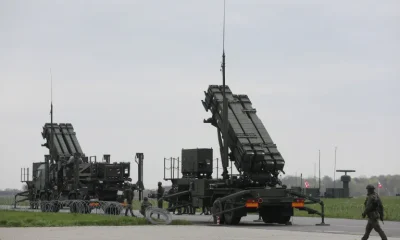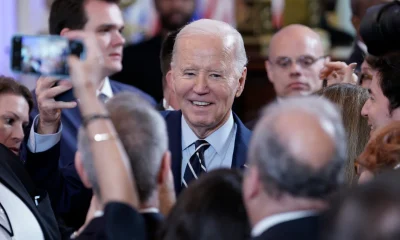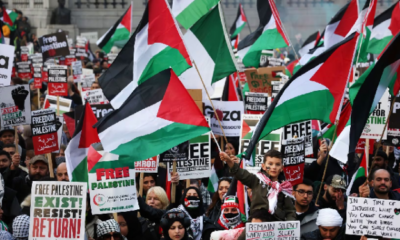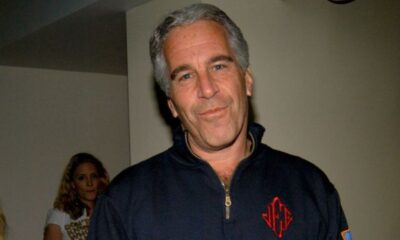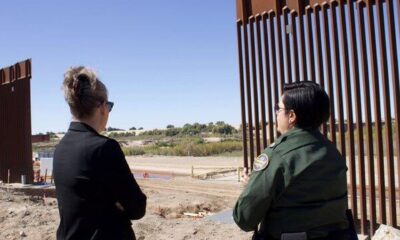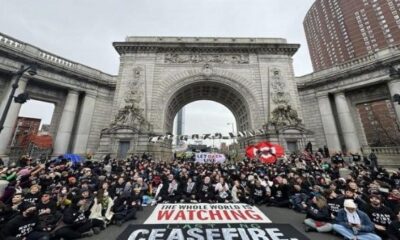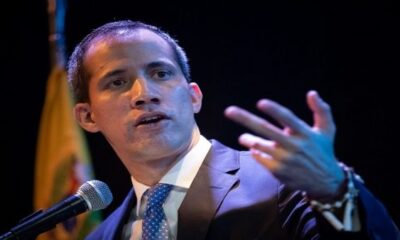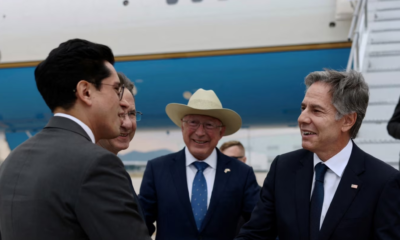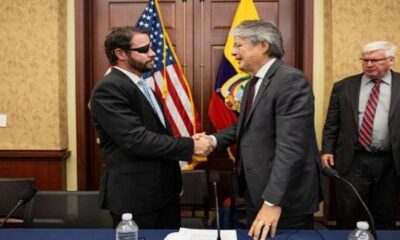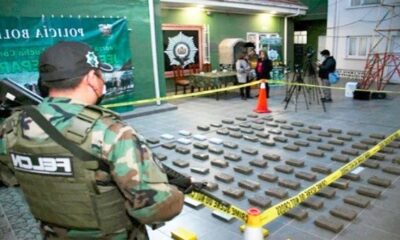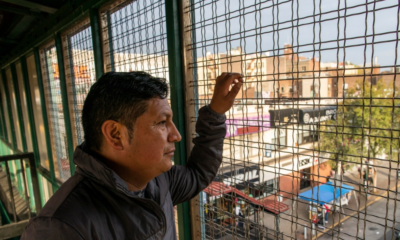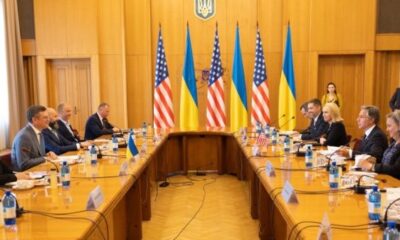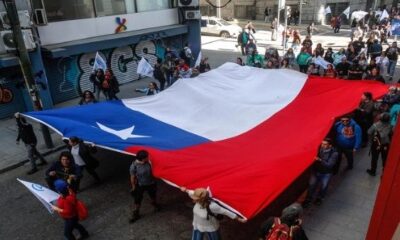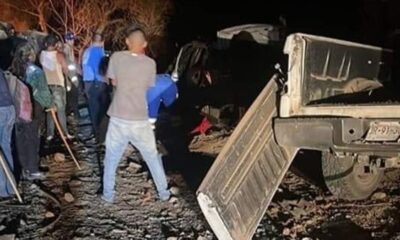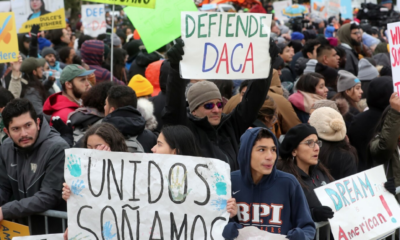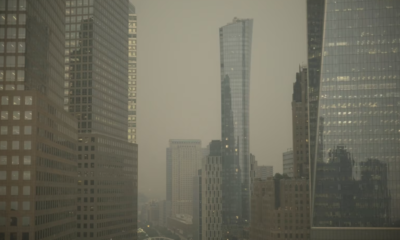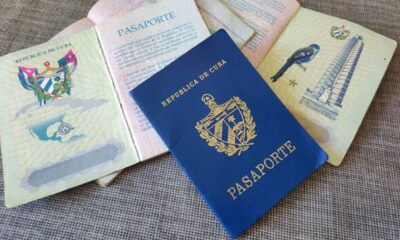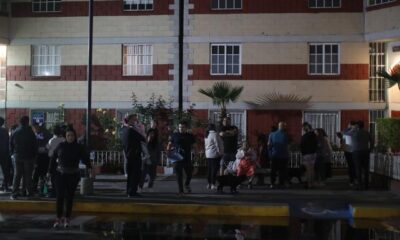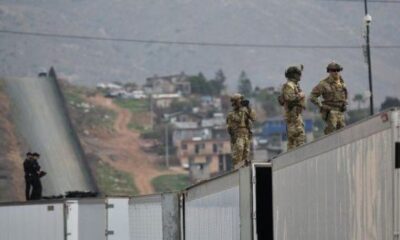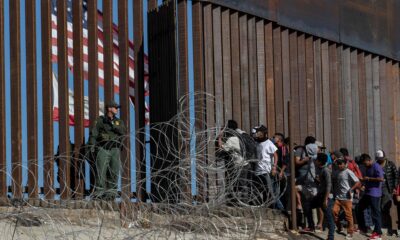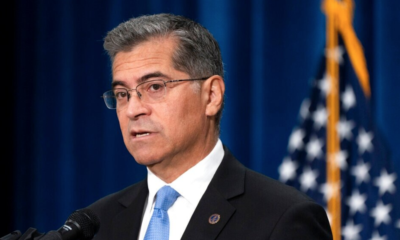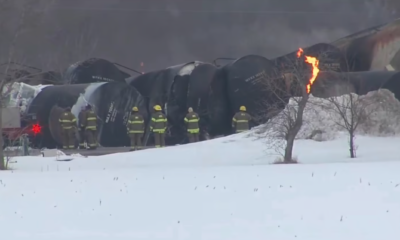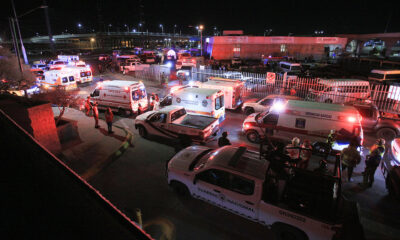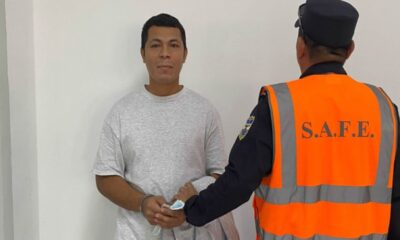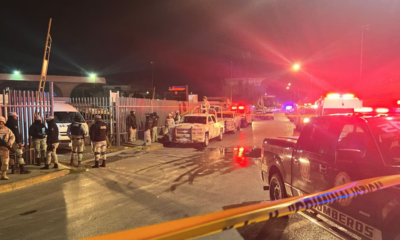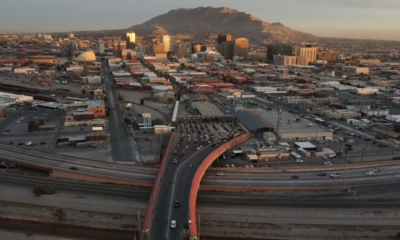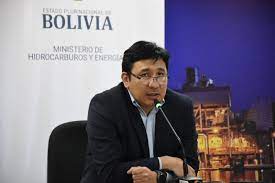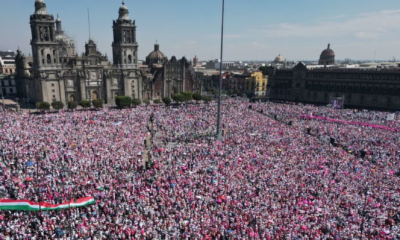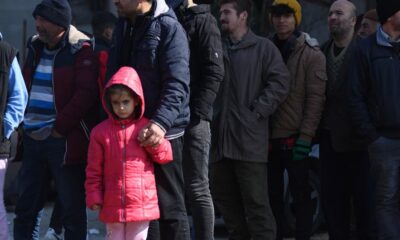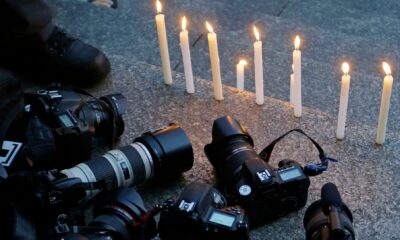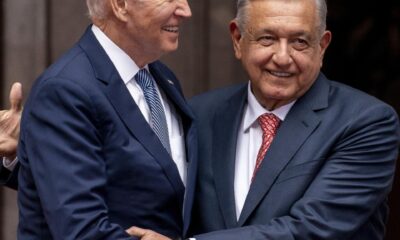International
Arizona to remove shipping container wall on US-Mexico border
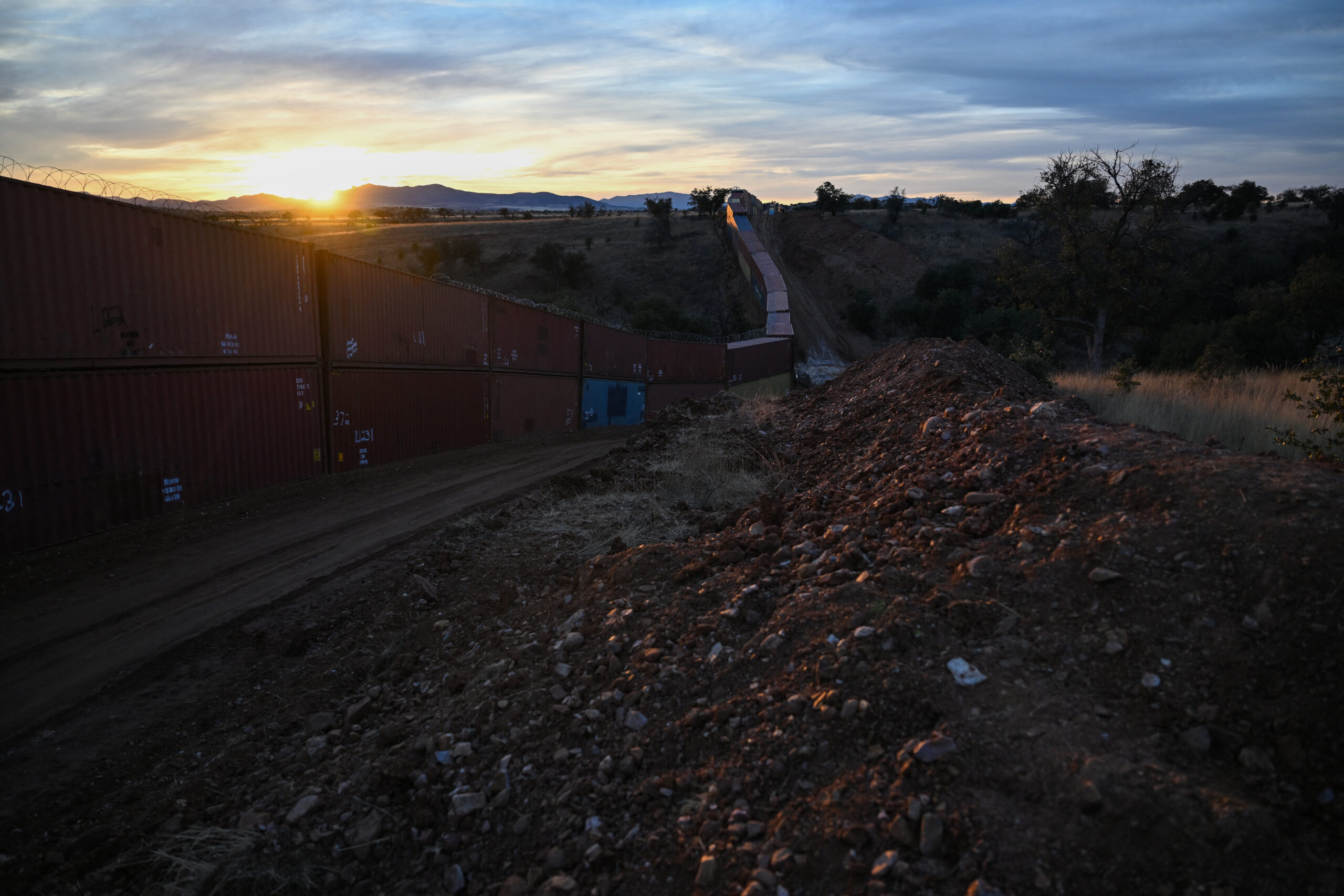
| By AFP | Paula Ramon |
Arizona agreed Wednesday to dismantle a wall of shipping containers at the Mexican border that critics said was an expensive, ecologically damaging political stunt that did nothing to keep migrants out of the United States.
The state’s Republican Governor Doug Ducey spent $90 million of taxpayers’ money lining up rusting boxes in what he said was a bid to stem the flow of people crossing into the country.
The corrugated containers, which snake for four miles (seven kilometers) through federal lands like a huge stationary cargo train, divide an important conservation area that is home to vulnerable species, but which is so difficult to traverse that people traffickers routinely avoid it.
Now Ducey, who leaves office early next year, will have to get rid of the 915 containers from the Coronado National Forest.
In an agreement reached Wednesday with the federal government, Ducey’s administration said it will “remove all previously installed shipping containers and associated equipment, materials, vehicles, and other objects from the United States’ properties on National Forest System lands within the Coronado National Forest.”
Biodiversity
From close up, the double-stacked container wall looks like the clumsy handiwork of a giant playing with building blocks.
Its presence is so jarring that, in addition to the federal court case, it was also the subject of two lawsuits by the Center for Biological Diversity, an environmental organization that has been active in the area for three decades.
“The biodiversity of this region is off the charts,” Russ McSpadden, a member of the organization, told AFP.
“It’s one of the most important conservation areas in the entire United States.”
Arizona shares around 370 miles (600 kilometers) of border with Mexico, including environmental preservation areas, national parks, military zones, and indigenous reservations.
Until the 2017 arrival in the White House of Donald Trump — who was propelled to power on his pledge to “Build That Wall” — there was very little in the way of a physical barrier separating it from Mexico.
Now vast stretches of the border have a fence that towers up to nine meters high.
Before the containers arrived in the Coronado National Forest — an area that can only be reached by dirt roads — the border here was demarcated by a wire fence.
That meager barrier was more than equal to the task of keeping people at bay, says McSpadden, whose cameras have picked up jaguars, and who has worked with teams collecting data on ocelots.
“I’ve never captured migrant traffic on any of the remote cameras,” he said.
“It’s an incredibly wild valley. There’s no real urban population anywhere nearby. It’s a very difficult part of the border for migrants to cross.”
And even if this were a heavily trafficked route, a casual observer can see that the shipping containers would not be very effective.
In several places that AFP visited, the boxes do not line up because of the uneven terrain, leaving gaps easily large enough for a person to walk through.
Others have holes rusted in them, and in some spots, it appears to have been impossible for workers to find a place stable enough to put a container.
A viral video shows a determined climber scaling the six-meter-high barrier in a matter of seconds, gaining easy purchase on the textured box walls.
But what the shipping containers do block is a waterway and the migration routes of the animals McSpadden studies.
“Jaguars know no borders,” he says.
“Southern Arizona, northern Mexico, it’s the same for them.”
With males known to range hundreds of miles, it’s easy for animals that came north to hunt to get trapped away from breeding populations south of the border.
“Jaguars want to move back and forth freely,” he says.
“This is their range, and the border wall bisects the jaguars’ home.”
International
U.S. Senate Rejects Budget, Bringing Government Closer to Shutdown Amid DHS Dispute

The U.S. Senate voted on Thursday against a budget proposal in a move aimed at pressuring changes at the Department of Homeland Security (DHS), following the killing of two civilians during a deployment of immigration agents in Minneapolis.
All Senate Democrats and seven Republican lawmakers voted against the bill, which requires 60 votes to advance, pushing the country closer to a partial government shutdown that would cut funding for several agencies, including the Pentagon and the Department of Health.
The rejection came as Senate leaders and the White House continue negotiations on a separate funding package for DHS that would allow reforms to the agency. Proposed measures include banning Immigration and Customs Enforcement (ICE) agents from wearing face coverings and requiring them to use body-worn cameras during operations.
The vote took place just hours after President Donald Trump said he was “close” to reaching an agreement with Democrats and did not believe the federal government would face another shutdown, following last year’s record stoppage.
“I don’t think the Democrats want a shutdown either, so we’ll work in a bipartisan way to avoid it. Hopefully, there will be no government shutdown. We’re working on that right now,” Trump said during a Cabinet meeting at the White House.
International
Trump Says Putin Agreed to One-Week Halt in Attacks on Ukraine Amid Extreme Cold

U.S. President Donald Trump said on Thursday that he secured a commitment from Russian President Vladimir Putinto halt attacks against Ukraine for one week, citing extreme weather conditions affecting the region.
“Because of the extreme cold (…) I personally asked Putin not to attack Kyiv or other cities and towns for a week. And he agreed. He was very pleasant,” Trump said during a Cabinet meeting broadcast by the White House.
Trump acknowledged that several advisers had questioned the decision to make the call.
“A lot of people told me not to waste the call because they wouldn’t agree. And he accepted. And we’re very happy they did, because they don’t need missiles hitting their towns and cities,” the president said.
According to Trump, Ukrainian authorities reacted with surprise to the announcement but welcomed the possibility of a temporary ceasefire.
“It’s extraordinarily cold, record cold (…) They say they’ve never experienced cold like this,” he added.
Ukrainian President Volodymyr Zelensky later commented on the announcement, expressing hope that the agreement would be honored.
International
Storm Kristin Kills Five in Portugal, Leaves Nearly 500,000 Without Power

Storm Kristin, which battered Portugal with heavy rain and strong winds early Wednesday, has left at least five people dead, while nearly half a million residents remained without electricity as of Thursday, according to updated figures from authorities.
The revised death toll was confirmed to AFP by a spokesperson for the National Emergency and Civil Protection Authority (ANPEC). On Wednesday, the agency had reported four fatalities.
Meanwhile, E-Redes, the country’s electricity distribution network operator, said that around 450,000 customers were still without power, particularly in central Portugal.
Emergency services responded to approximately 1,500 incidents between midnight and 8:00 a.m. local time on Wednesday, as the storm caused widespread disruptions.
The Portuguese government described Kristin as an “extreme weather event” that inflicted significant damage across several regions of the country. At the height of the storm, as many as 850,000 households and institutions lost electricity during the early hours of Wednesday.
Several municipalities ordered the closure of schools, many of which remained shut on Thursday due to ongoing adverse conditions.
Ricardo Costa, regional deputy commander of the Leiria Fire Brigade, said residents continue to seek assistance as rainfall persists.
“Even though the rain is not extremely intense, it is causing extensive damage to homes,” he noted.
In Figueira da Foz, a coastal city in central Portugal, strong winds toppled a giant Ferris wheel, underscoring the severity of the storm.
-

 International4 days ago
International4 days agoU.S. Senate Rejects Budget, Bringing Government Closer to Shutdown Amid DHS Dispute
-

 Central America3 days ago
Central America3 days agoPanama Supreme Court Strikes Down Panama Ports Concession as Unconstitutional
-

 International4 days ago
International4 days agoStorm Kristin Kills Five in Portugal, Leaves Nearly 500,000 Without Power
-

 Central America3 days ago
Central America3 days agoU.S. and Guatemala Sign Trade Deal Granting Zero Tariffs to Most Exports
-

 International4 days ago
International4 days agoMan Arrested After Vehicle Crashes Into Jewish Institution in Brooklyn
-

 International4 days ago
International4 days agoTrump Says Putin Agreed to One-Week Halt in Attacks on Ukraine Amid Extreme Cold
-

 Central America1 day ago
Central America1 day agoCosta Rica Goes to the Polls as Voters Choose Continuity or Change



























